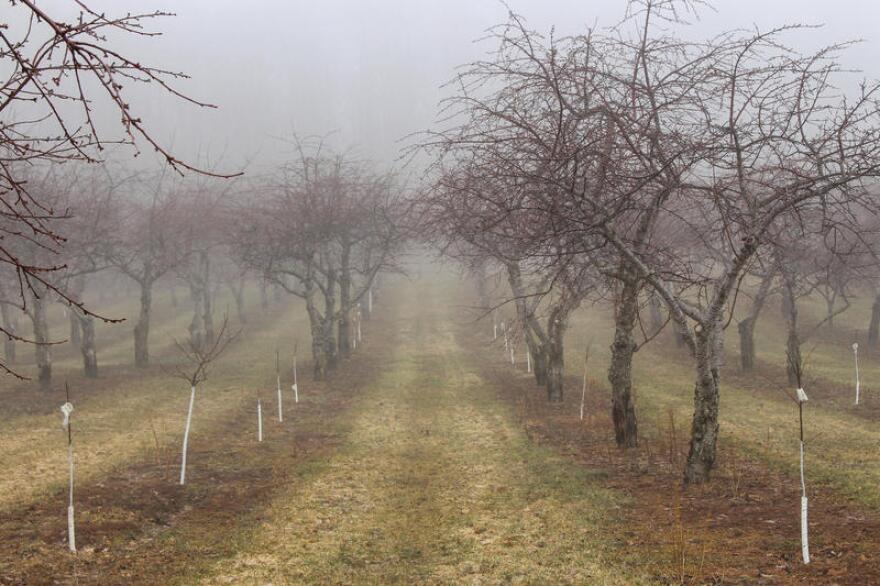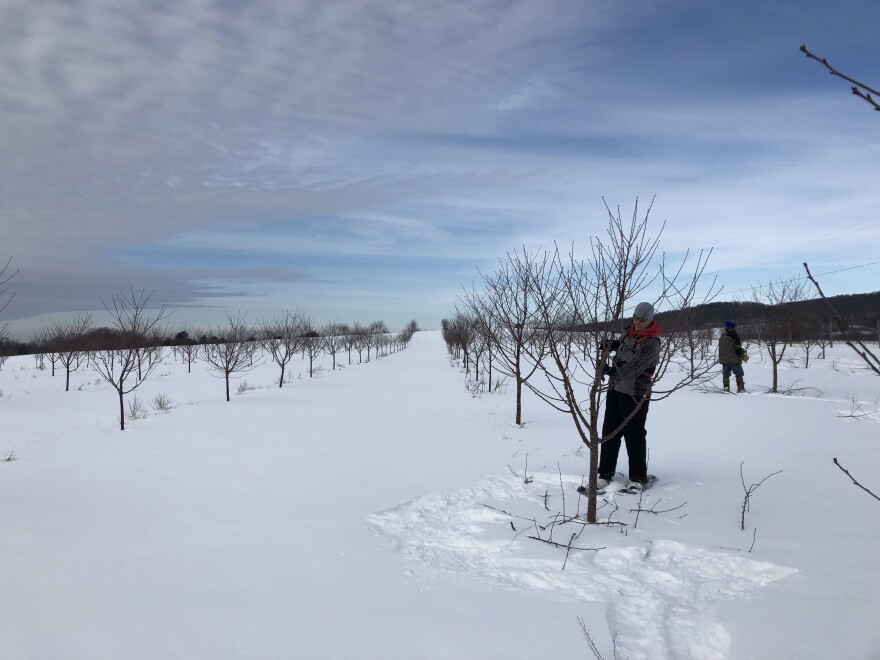For the past decade, Americans have been buying tart cherries from Turkey for cheap. Tart cherry farmers in Michigan say that’s hurting their bottom line.
Now they’re hoping a new bill in Washington will balance the scales.
On a sunny but cold day at a cherry orchard north of Cedar, second generation cherry farmer Ben LaCross, of Leelanau Fruit Company, prunes some young cherry trees with electric shears.
“We’re trying to open up the scaffolds of the limbs to let more light in and force the tree to grow in the direction that we want it to,” LaCross says.
Tart cherries are used by food manufacturers in things like cherry pies and turnovers. LaCross hopes that, come spring, this pruning will maximize the orchard's yield. That would mean a lot because many tart cherry farmers across Michigan are treading water.
They face stiff foreign competition. Specifically from the country of Turkey, who for years has flooded U.S. markets with their tart cherries. When this started around 2012, it was actually a good thing. Domestic cherry farmers had a few bad years in a row and Turkish cherries came in and met demand.
But when U.S. crops bounced back, farmers were boxed out. Some of Turkey’s cherry products were going for about half the price of domestic ones.
Farmers like LaCross are calling foul.
“Every year that we’re dealing with these Turkish cherries, we’re looking at basically a loss year on our farms,” LaCross says.

Foreign competition
Turkish cherries are cheaper because evidence suggests tart cherries are highly subsidized by Turkey's government and, until a few months ago, came into the U.S. tariff-free.
LaCross and other cherry farmers say those subsidies allow Turkey to sell them below the cost of production.
“If we can’t defend our domestic market against unfair foreign competition, we might as well not be in business anymore,” LaCross says.
According to the Cherry Marketing Institute, the U.S. was importing about 24 million pounds of Turkish cherry products annually in 2008. As of 2016 that number is more than 200 million pounds.
For a long time, there wasn’t much tart cherry farmers could do about this. Unlike bigger industries, they aren’t equipped to go after an entire country’s trade practices. So U.S. Sen. Gary Peters (D-Mich.) wants the federal government to step in. He introduced legislation last month to make the Commerce Department investigate those Turkish subsidies.
“We need the Department of Commerce to be much more aggressive when it comes to looking at actions being taken to undercut small industries,” Peters says.
If the Commerce Department finds out those cherries are heavily subsidized, the U.S. can levy tariffs to offset the price difference. Peters says that’s on the table.
“The key is ... to make a price that is consistent with what it actually costs to grow cherries and not to be subsidized from the government,” Peters says.
Tariffs on the horizon
In a meeting with Peters, President Donald Trump said his administration wants to help cherry farmers.
"I think it's a fantastic idea, because you're right they can't hire the lawyers," Trump says. "It's too small, but in a double way, it's very, very big."
In the fall, the Trump administration put a small tariff on tart cherry juice concentrate from Turkey. Michigan cherry farmers say that’s a good sign, but it’s mostly a symbolic indication that the President is on their side. Many say they want steeper tariffs on more products.
But International Economics Professor Alan Deardorff says that may have some unintended consequences. Deardorff, who teaches at the University of Michigan, says tariffs may drive cherry prices up, but that would bring demand down.
“You’re trying to raise the price for your producers so that they’ll be better off, and you’re willing to do that even though you know you’re going to inflict more harm on the buyers,” Deardorff says.

Cherry farmer Ben LaCross says food manufacturers that make cherry pies and turnovers would bear the brunt of any price hike - not consumers. And even if cherry prices go up at the grocery store, LaCross says they would still be cheaper than a decade ago - before Turkish cherries took off.
Ultimately, he says U.S. farmers just want a level playing field.
“We welcome competition, but it has to be fair," LaCross says. "We can’t compete against a product with both of our hands tied behind our backs, and that’s where we are right now.”
A supplement to this story was part of Point North. Listen to the entire episode here.


